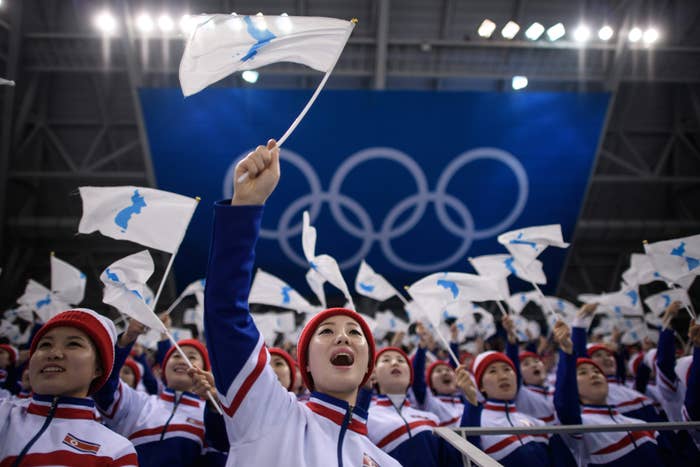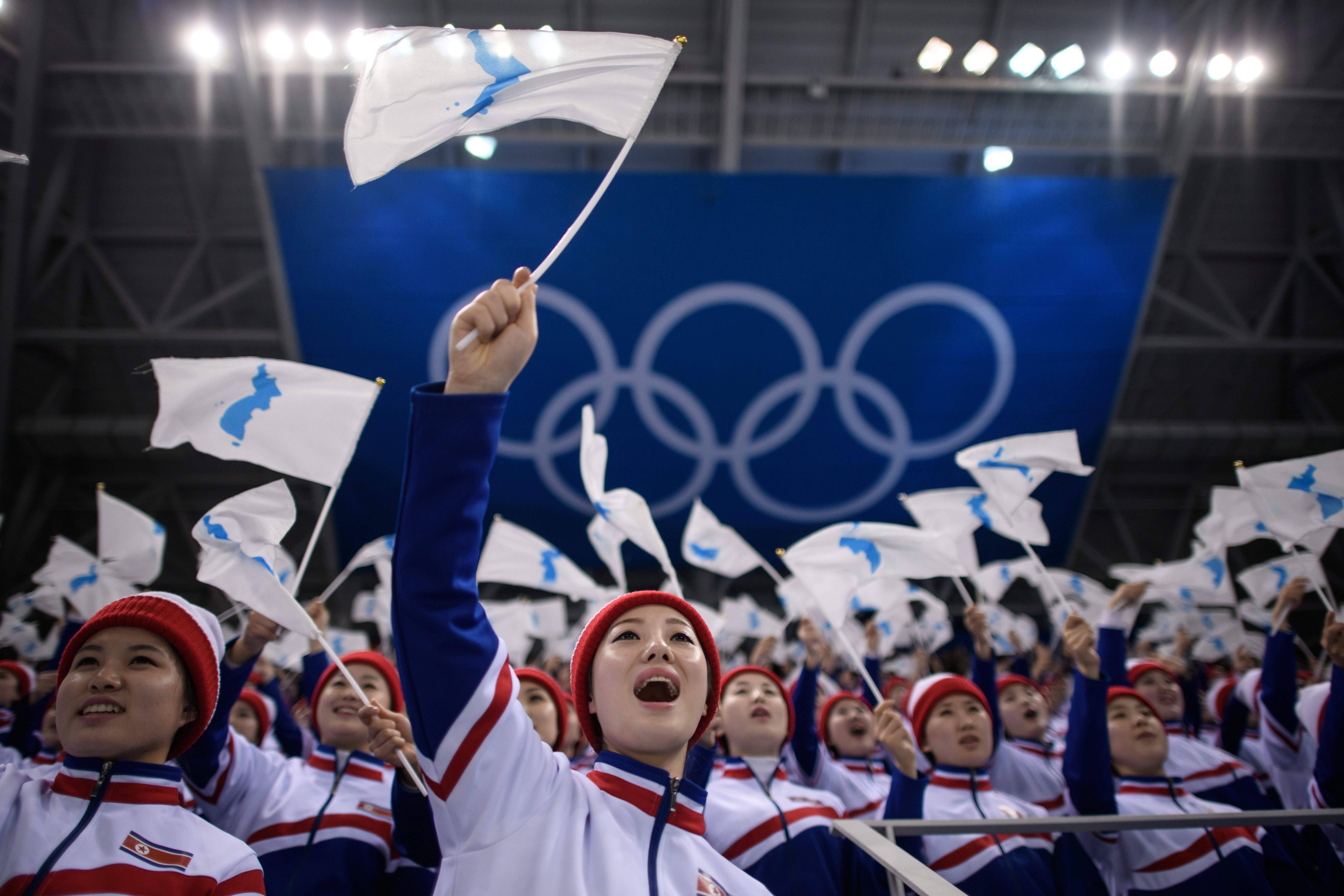
This year’s Winter Olympics are being held in Pyeongchang, a mountainous region of South Korea located just 50 miles away from North Korea. In a surprise move, North Korea and South Korea have united under one flag for the games. This is extremely unusual because the two countries—and their citizens—have been separated by one of the most heavily armed borders in the world since the 1950s.
North Korea is ruled by a volatile dictator, Kim Jong-un. The country is developing nuclear warheads which may now have the capability to reach the U.S. Rising tensions between the U.S. (a longtime ally of South Korea) and North Korea are particularly alarming given the verbal sparring that’s been going on between Jong-un and America’s own unstable leader, Donald Trump.
North Korean Leader Kim Jong Un just stated that the “Nuclear Button is on his desk at all times.” Will someone from his depleted and food starved regime please inform him that I too have a Nuclear Button, but it is a much bigger & more powerful one than his, and my Button works!
— Donald J. Trump (@realDonaldTrump) January 3, 2018
Jong-un surprised the world in his new year’s speech this year by saying he wanted to send a delegation to the Winter Olympics. This was a huge departure from the North’s position on the last Olympics hosted in South Korea in 1988. Not only did the North Korean government boycott the 1988 Olympics, but they also blew up a South Korean passenger plane ahead of the games, killing 115 passengers in an attempt to destabilize the South Korean government and scare off attendees.
Following Jong-un’s announcement, North Korea negotiated with South Korea and the International Olympic Committee, which culminated in the two countries marching under the “unified Korea” flag and organizing a unified women’s ice hockey team. North Koreans also came away from the negotiations with additional slots for their players, with 22 in their delegation, although just two had qualified on athletic merit.
This move has re-opened diplomatic channels between the two nations after a two-year hiatus. South Korean President Moon Jae-in has referred to this year’s games as the “Peace Olympics,” presenting the new relations between the two countries as an unprecedented opening for more lasting peace.
In addition to improving North Korea’s diplomatic standing on the international stage, this move allows the North Korean government to send footage of their participation in the Olympics back home to use as propaganda in support of Jong-un’s administration. North Korea is notoriously closed off from the world, and all media consumption is controlled by the government. The 2018 Olympics will likely be broadcast in the country, but will be censored, with any losses hidden from the public. This was precisely what happened at the 2014 Asian Games, when North Korea faced off against South Korea in the men’s soccer finals. The North lost in overtime, and all news about the game was scrubbed from the country’s history.
The total delegation from North Korea amounts to over 500 people, almost half of whom are part of a cheerleading squad known as Kim Jong-un’s “army of beauties.” Kim Jong-un’s sister, Kim Yo-jong, is leading this “charm offensive” alongside North Korea’s ceremonial head of state, Kim Yong-nam. Their visit represents the most senior delegation to visit South Korea since the Korean War.
Relations between America and North Korea are not good. North Korea’s 2017 tests of nuclear weapons and intercontinental ballistic missiles, combined with the volatility of both the U.S. president and Kim Jong-un, make the possibility of war between the two nations a threat to be taken seriously.
The U.S. has infuriated North Korea by installing a missile defense system in South Korea. Trump threatened in a U.N. speech last year to “totally destroy” North Korea. Trump has also tweeted that the U.S. Secretary of State Rex Tillerson was “wasting his time” trying to negotiate with North Korea, and that “only one thing will work,” suggesting the use of military force.
It’s not clear if North Korea’s cooperation with the South in the Olympics actually does anything to lessen the terrifying possibility of war. Joint military drills carried out by the U.S. and South Korea have been suspended to keep the peace during the games, but will likely resume once they’re over. For the foreseeable future, the U.S. will continue to impose sanctions and place diplomatic pressure on North Korea to terminate their nuclear program.
"No pressure comes off until they are actually doing something that the alliance believes represents a meaningful step toward denuclearization," Vice President Pence told the Washington Post.
North and South Korea have been divided since the end of World War Two. Korea was colonized by Japan until it lost WWII, when the Soviet Union took over the north and the U.S. took over the south. Things quickly went downhill as the U.S. and the Soviet Union became increasingly hostile during the Cold War. War broke out when the North invaded the South in 1950. The North was backed by the Soviet Union and China, while the South was backed by the U.S. and the United Nations.
The two countries signed an armistice in 1953, which created the Demilitarized Zone (DMZ), a barrier between the two countries that was supposed to be a temporary solution to the conflict. Instead, the DMZ continues to separate North and South Korea today, and is one of the most heavily militarized borders in the world. Since the two countries never signed a peace deal and neither side was able to claim victory, they are technically still at war. While both governments officially support reunification, they haven’t been able to agree on the terms.
Today, North Korea, a country of 25 million people, is an autocratic state (governed by a ruler with absolute power) that is isolated from the rest of the world. Since he took over leadership of the country in 2011, Jong-un has followed in his father’s and grandfather’s footsteps by denying freedom of speech and movement to the country’s citizens. Those who diverge from the government’s strict rules are harshly punished through torture and concentration camps. Most people live in extreme poverty, with the economy dependent on forced labor beginning in childhood.
South Korea is a democracy of 51 million people and a key U.S. ally. Moon Jae-in, South Korea’s current president, is a former human rights attorney and the most progressive candidate to win the nation’s highest office. He was elected last year following months of peaceful protest against political corruption, which culminated in the impeachment of the previous president and demonstrated the power of civic engagement in strengthening democracy. South Korea is also in many ways more technologically advanced than the U.S., with the highest rate of internet proliferation in the world.
Many are concerned that this is simply a public relations ploy by North Korea to build goodwill while they continue to develop their nuclear arsenal. It’s not clear if the breakthrough will influence more serious policy conversations after the games are over.
"Despite these overtures to improve relations with the South, North Korea has yet to show any intention to fulfill its international obligations regarding denuclearization," said South Korea's Foreign Minister Kang Kyung-wha.

